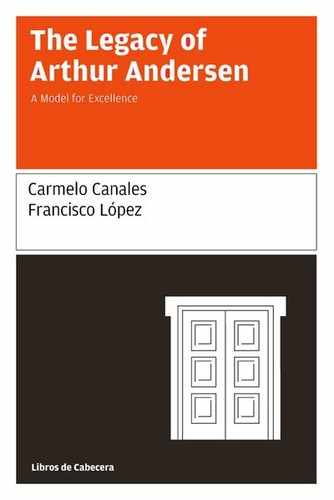19. The Value Proposal to Society
At the end of the last chapter, the list of industries where Andersen was active in Spain is a clear sample of its impact in society at large. Such an impact was the consequence of the value proposal Andersen made to society.
The proposal consisted of several elements, all stemming from the seven basic columns we have described.
We can begin with Unity, and we can reason that the Firm brought to the countries where it developed the dimension given by the presence of a really multinational Firm, of huge dimensions. The Firm’s local presence implied the appointment of local partners that became also international partners, and the opportunity of enjoying a knowledge and technology transfer that gave huge direct and indirect power to the country’s capacities. In the case of Spain that impact was remarkable and evident.
The Integrity principle was another clear contribution to society, especially in countries where an important part of the business world was not accustomed to respect the norms.
Andersen’s bid for transparency, for instance, gave a decisive thrust to modernization in many countries. In Spain this supposed a giant step for the integration of Spanish society into the developed economy.
As an example of what Integrity meant we can mention that the first thing a graduate freshman received on arrival at the office was a copy of the Firm’s Ethical Standard. The message was clear: this is the most important. That message spread towards society through the professionals and the clients.
Cooperation permitted to enjoy the real and specific opportunity, for Andersen’s professionals and their clients, of sharing innovative and successful international experiences by means of the professionals network maintained by the Firm, always generous with its support. It also permitted, and that is not insignificant, the opportunity of transferring Spanish solutions and experiences to other countries. This way, the Firm also helped in the international opening-up of the countries where it was established, like in Spain.
Quite remarkable, even if obvious, was the impact that the generation of English-speaking professionals had in countries speaking other languages, since the Firm assumed, it could not be otherwise, English as the common language. English was an essential requirement to join Andersen. A minimum level was required from any professional. And to be appointed partner the level was maximum, almost without exception.
The Arthurs extended the customary use of English and the international orientation when they were leaving the Firm.
The fourth principle, Ambition, meant too a contribution to society, mainly in left-behind countries such as Spain, that suffered during the autarchy years and had a closed-country, no-resources complex. Andersen faced the problems without inhibitions with a long term and wide range view. Andersen was saying “think big”, think in style, everything is possible. The Andersen professionals went to work without inhibitions and that transmitted their attitude to the environment in which they moved. They were “winners”. Their clients got infected with that winner spirit. And society too.
In Spain, Andersen did its bit in the renewed surge of the winning spirit that the country experienced in the 80s and still more in the 90s, especially after the Barcelona Olympics in 1992.
As for the fifth principle, Talent, it is the easiest to identify with the social value proposal. Andersen created valued jobs, providing a decent professional future and a brilliant career to young university graduates.
In Spain that type of career did not exist until Andersen arrived.
On the other side, the huge training effort helped to keep the professionals updated along their full career. That, combined with the effort to outplace the professionals that didn’t progress inside the Firm, contributed to spread the Andersen seed throughout all economic sectors in the countries where the Firm worked. In Spain that phenomenon was, and still is, evident because thousands of Andersen alumni successfully exercise their professions in many Spanish companies.
The sixth principle, Service, the concern to serve the client, to give a quality service, meant also a benefit to society because it raised the quality standards to a previously unknown level. To do things fast and well was not common. Andersen showed that it could be made.
In the professional services sector Andersen had a strong influence in the way of doing auditing, consulting and tax advice, raising the standards.
The last, seventh column, Results, had a direct influence on society by way of the taxes paid by the Firm and its professionals, and an indirect one by conveying a results oriented philosophy, very American, that seemed incompatible with the business culture of countries like Spain, and that Andersen proved otherwise.
Finally, we would like to finish by bringing out a direct and immediate contribution to society made by the Andersen partners, who made donations of part of their profits every year to non-profit entities of their choice. These donations were channeled through the Andersen Foundation. In Spain, many NGOs, hospitals, old people institutions, etc. received these donations for many years.
